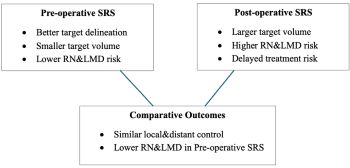Neoadjuvant stereotactic radiosurgery for brain metastases: Current evidence and clinical perspectives
DOI:
https://doi.org/10.17305/bb.2025.12890Keywords:
Brain metastasis, stereotactic radiosurgery, SRS, neoadjuvant treatmentAbstract
Neoadjuvant stereotactic radiosurgery (SRS) has emerged as a promising strategy for managing brain metastases, offering several advantages over traditional postoperative approaches. By delivering targeted radiation prior to surgical resection, neoadjuvant SRS aims to enhance local tumor control, reduce the risk of leptomeningeal dissemination, and optimize treatment efficiency. Recent findings suggest that neoadjuvant SRS provides comparable, if not superior, local control compared to postoperative SRS, while exhibiting lower rates of radiation necrosis and leptomeningeal disease. However, uncertainties persist regarding optimal dosing regimens, treatment timing, and patient selection criteria, as factors such as tumor size, volume, and histology may significantly influence clinical outcomes. Additionally, while neoadjuvant SRS addresses challenges related to target delineation and delays associated with postoperative treatment, its long-term efficacy and integration with systemic therapies require further investigation. This review consolidates evidence from recent retrospective and prospective studies, focusing on key outcomes such as local control rates, radiation toxicity profiles, and overall survival.
Citations
Downloads

Downloads
Published
Issue
Section
Categories
License
Copyright (c) 2025 Aybala Nur Ucgul, Ahmet Oguz Tugcu, Ozge Petek Erpolat

This work is licensed under a Creative Commons Attribution 4.0 International License.









